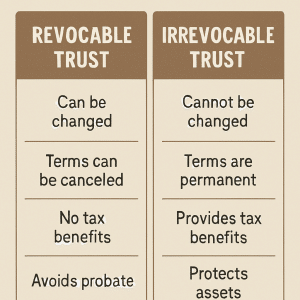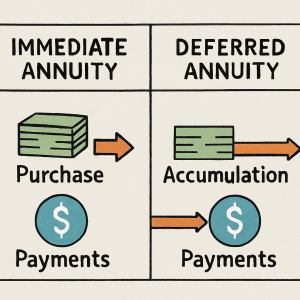Are Annuities Taxable?
Annuity payments can be partly taxable or fully taxable depending on how the annuity was funded and whether you’ve annuitized the contract. The key idea is your “investment in the contract” (basis): money you paid in after tax can come back tax-free; earnings are taxed as ordinary income.
Qualified vs. Nonqualified payments
Qualified annuities (funded with pre-tax dollars, e.g., within IRAs or employer plans)
- Payments are generally fully taxable as ordinary income because contributions and growth were tax-deferred and not previously taxed.
- Reported on Form 1099‑R.
Nonqualified annuities (funded with after-tax dollars, outside retirement plans)
- After you annuitize, each payment is split between:
- Non-taxable basis (your investment in the contract), and
- Taxable earnings (growth), taxed as ordinary income.
- This split is determined by an exclusion ratio and continues until your basis is fully recovered; after the basis is exhausted, payments become fully taxable. Reported on Form 1099‑R.
- After you annuitize, each payment is split between:
How the exclusion ratio works (nonqualified annuities)
- The exclusion ratio allocates each payment between basis and earnings.
- Practically, you recover your basis over your life expectancy or the payment period, while the remainder of each payment is taxable.
- Once the total basis has been recovered, later payments are fully taxable.
Quick example
- You annuitize a nonqualified annuity worth 120,000120,000: basis =90,000=90,000, earnings =30,000=30,000.
- Monthly payment: 600600.
- If the calculated exclusion ratio is 75%, then:
- 600×0.75=450600×0.75=450 is non-taxable basis,
- 600×0.25=150600×0.25=150 is taxable ordinary income each month,
- until the 90,00090,000 basis is fully recovered; thereafter, payments are fully taxable.
Reporting and common misconceptions
- Payments are taxed at ordinary income rates, not capital gains rates.
- Insurers issue Form 1099‑R showing taxable amounts; keep your records of basis to ensure accurate reporting.
- The exclusion ratio applies to annuitized payment streams; it’s different from the LIFO rule used for pre-annuitization withdrawals.
This guide explains the tax rules in plain English so you can avoid surprises and plan smarter. If you are considering purchasing an annuity, you can compare today’s best fixed annuity rates at our online marketplace.
Key takeaways
-
Earnings in annuities grow tax-deferred, but taxes apply when you take money out.
-
Qualified annuities (funded with pre-tax dollars) are generally fully taxable upon distribution.
-
Non-qualified annuities (funded with after-tax dollars) are taxed only on the earnings, not your original principal.
-
Beneficiaries pay ordinary income tax on the taxable portion of what they receive; annuities do not get step-up in basis like stocks.
Are annuity withdrawals taxable?
Withdrawals from annuities can be partly or fully taxable depending on the contract type, funding source, and whether the annuity has been annuitized.
Before annuitization, nonqualified withdrawals generally follow LIFO (last-in, first-out), while qualified withdrawals are usually fully taxable. After annuitization, payments are governed by the exclusion ratio rather than LIFO. Here’s how it works and what the IRS says.
Qualified vs. nonqualified annuity withdrawals
Qualified annuities (IRA, 403(b), or employer plan annuities):
- Distributions are generally fully taxable as ordinary income because contributions were pre-tax and growth was tax-deferred.
- The insurer or custodian reports taxable distributions on Form 1099‑R. See IRS guidance for pensions and annuities.
Nonqualified annuities (funded with after-tax dollars, outside retirement plans):
- Before annuitization, withdrawals typically follow LIFO: earnings come out first and are taxable as ordinary income; once all gains are withdrawn, the remaining principal (basis) is non-taxable.
- After annuitization, each payment is split between non-taxable basis and taxable earnings under the exclusion ratio (not LIFO).
LIFO applies before annuitization
- LIFO taxation means the most recent growth is distributed first.
- Practical effect: early partial withdrawals are fully or mostly taxable until you’ve exhausted the contract’s gains; only then does basis come out tax-free.
- This pre-annuitization rule is distinct from the exclusion ratio that applies to annuitized payments.
Partial withdrawals vs. full surrender
Partial withdrawals:
- Taxable portion equals the gain included in the withdrawn amount under LIFO for nonqualified contracts; for qualified contracts, the full amount is typically taxable.
- The insurer issues Form 1099‑R reflecting the taxable component.
Full surrender (nonqualified):
- Total gain = cash value − investment in the contract (basis).
- Under LIFO, the surrender proceeds are deemed to include earnings first; you’ll owe ordinary income tax on the earnings portion, while the basis is non-taxable.
- Surrender charges and market value adjustments don’t change the ordinary-income character of gains.
Early distribution 10% additional tax (and exceptions)
- If you take a taxable distribution before age 59½, the taxable amount may be subject to an additional 10% tax on early distributions, on top of regular income tax.
- Common exceptions (availability varies by plan type and situation) can include:
- Disability
- Substantially equal periodic payments (SEPP/72(t))
- Certain death benefits to beneficiaries
- Other plan- or IRA-specific exceptions detailed by the IRS
- See IRS Publication 590‑B for IRA distribution rules and exceptions, and Topic No. 557 for the additional 10% tax.
Key takeaways for tax planning
- Nonqualified before annuitization: LIFO means earnings are taxed first; principal last.
- Qualified distributions: usually fully taxable as ordinary income.
- After annuitization: exclusion ratio governs payments; LIFO no longer applies.
- Under 59½: the taxable portion may incur a 10% additional tax unless an exception applies.
- Keep thorough records of your basis and review your 1099‑R to avoid overpaying.
Citations:
- IRS Topic No. 410: Pensions and Annuities
- IRS Publication 575: Pension and Annuity Income
- IRS Publication 590‑B: Distributions from IRAs (including exceptions)
- IRS Topic No. 557: Additional Tax on Early Distributions
- IRS About Form 1099‑R
Are annuity death benefits taxable?
When an annuity owner dies, the beneficiary may receive a death benefit or the remaining contract value. Tax treatment:
- Income taxes: Beneficiaries pay ordinary income tax on the annuity’s taxable portion (the earnings). The owner’s basis remains; annuities do not receive a step-up in basis like stocks or mutual funds.
- Timing matters: Beneficiaries can often choose options such as a lump sum, 5-year rule, or lifetime payout via a “stretch” (if permitted by contract/state rules). The election affects when and how much tax they pay each year.
- Estate taxes: If the decedent’s estate is large enough to be subject to estate tax, the annuity’s value may be included in the estate. This is separate from income tax.
are annuities taxable to beneficiaries?
Yes, beneficiaries are taxed on the annuity’s untaxed earnings upon receipt, at their ordinary income tax rates.
Key points:
- The beneficiary inherits the owner’s cost basis (no step-up).
- If paid as a lump sum, the taxable amount may be significant in one year.
- If paid over time, each payment includes a taxable portion. Non-qualified annuities may use an exclusion ratio; non-annuitized distributions usually follow LIFO.
- If the beneficiary is a spouse, they may have additional options (e.g., continuation of the contract as owner) depending on the insurer and contract terms.
are inherited annuities taxable?
Inherited annuities are taxable on gains, not on the original after-tax principal.
- Non-qualified inherited annuities: Beneficiaries owe ordinary income tax on earnings when received. They can often elect payout methods, which affect tax timing.
- Qualified inherited annuities (IRAs/403(b)s): Subject to inherited IRA/plan distribution rules (e.g., 10-year rule, life expectancy payments for eligible designated beneficiaries). Distributions are generally fully taxable as ordinary income.
- No capital gains rates: Annuity gains are not taxed at capital gains rates; they are taxed as ordinary income.
How are non-qualified annuities taxed?
Non-qualified annuities are funded with after-tax dollars. For nonqualified annuities, only the earnings above your ‘investment in the contract’ (basis) are taxable.
Taxation basics:
- Growth is tax-deferred: You do not pay tax annually on interest or credits inside the annuity.
- Taxes upon distribution: You pay ordinary income tax on the earnings portion. Your principal (basis) is not taxed again.
- Withdrawals vs. annuitization:
- Withdrawals follow LIFO—earnings first (taxable), then basis.
- Annuitization uses an exclusion ratio—each payment contains both taxable earnings and tax-free basis until the basis is fully recovered.
- 10% penalty: Applies to taxable distributions before age 59½ unless an exception applies.
Are Qualified annuities taxable?
Qualified annuities are inside tax-deferred retirement accounts (IRAs, 403(b), qualified plans) funded with pre-tax dollars or tax-deductible contributions. Qualified annuities funded with pre-tax dollars. Distributions from qualified annuities are generally fully taxable as ordinary income and reported annually on Form 1099‑R.
- Generally fully taxable: Distributions are taxed as ordinary income because both contributions and earnings were tax-deferred.
- RMDs: If held in certain accounts, required minimum distributions (RMDs) may apply beginning at the applicable age (check current IRS rules; many cases start at age 73 depending on legislation).
- Roth annuities: If funded within a Roth IRA and held long enough to meet qualified distribution rules, payouts can be tax-free; however, ordering rules and qualification requirements apply.
Common scenarios and tax tips
- Partial withdrawals to supplement income: Expect taxable earnings first from non-qualified annuities; plan timing to manage tax brackets.
- Annuitization for lifetime income: Spreads taxable income over time via exclusion ratio (non-qualified), often simplifying budgeting.
- Beneficiaries and estate planning: Consider contract ownership, annuitant designation, and beneficiary options; spousal continuation may avoid immediate taxation.
- 1035 exchanges: You can exchange one non-qualified annuity for another via a tax-free 1035 exchange, preserving basis and deferring taxes. This does not avoid future taxes—just defers them.
- State taxes: In addition to federal income tax, state taxes may apply. Indiana residents should check state-specific rules and credits.
Frequently asked questions
-
Are annuity payments taxable?
Yes. Non-qualified annuity payments are partly taxable and partly a return of your after-tax principal based on the IRS exclusion ratio. Qualified annuity payments (e.g., from IRAs/403(b)s) are generally fully taxable as ordinary income.
-
Are annuity withdrawals taxable?
Typically yes. Non-qualified withdrawals follow LIFO (earnings first) and are taxed as ordinary income until gains are exhausted. Qualified withdrawals are generally fully taxable. Withdrawals before age 59½ may incur a 10% IRS penalty on the taxable portion.
-
Are annuity death benefits taxable?
Beneficiaries owe ordinary income tax on the untaxed earnings in the annuity when they receive payments or a lump sum. Annuities do not receive a step-up in basis at death like stocks; the decedent’s cost basis carries over.
-
Are annuities taxable to beneficiaries?
Yes, beneficiaries are taxed on the annuity’s taxable portion (earnings). They can often choose payout options (lump sum, period certain, lifetime), which affect timing and annual tax liability. Spouses may have additional options like contract continuation.
-
Are inherited annuities taxable?
Inherited annuities are taxable on gains. Non-qualified inherited annuities are taxed on earnings when distributed. Qualified inherited annuities follow inherited IRA/plan rules (e.g., 10-year rule) and distributions are generally fully taxable as ordinary income.
-
Are non-qualified annuities taxable?
Growth is tax-deferred, and taxes apply when money comes out. You owe ordinary income tax on the earnings portion; your original after-tax principal is not taxed again. Withdrawals use LIFO; annuitization uses the exclusion ratio.
-
Are qualified annuities taxable?
Yes. Since they are funded with pre-tax or tax-deductible dollars, distributions are generally fully taxable as ordinary income. RMDs may apply depending on account type and age. Roth annuities inside Roth IRAs can be tax-free if qualified.
Annuity Taxation Quiz
i Sources & Citations
We regularly update this page and cite primary sources and regulator guidance:
- IRS Topic No. 410: Pensions and Annuities
- About Form 1099‑R (Distributions from Pensions, Annuities, Retirement or Profit‑Sharing Plans, IRAs, Insurance Contracts, etc.)
- About Publication 575: Pension and Annuity Income
- About Publication 590‑B: Distributions from Individual Retirement Arrangements (IRAs)
- IRS Topic No. 557: Additional Tax on Early Distributions
- About Publication 559: Survivors, Executors, and Administrators
- Estate Tax – IRS Overview
- How Are Annuities Taxed? (Annuity.org)
- IRS Topic No. 412: Lump-Sum Distributions
- Publication 939: General Rule for Pensions and Annuities (Exclusion Ratio)













